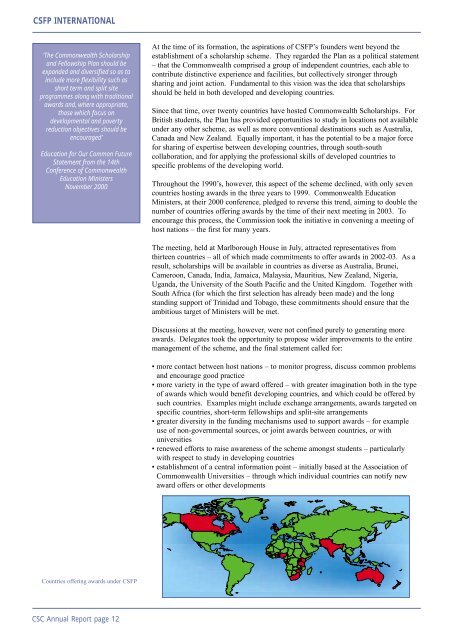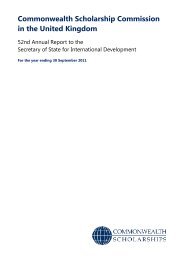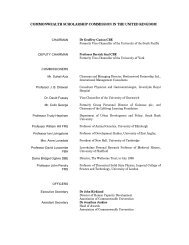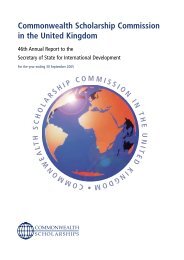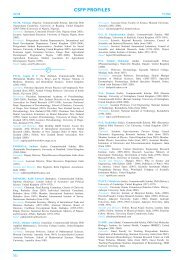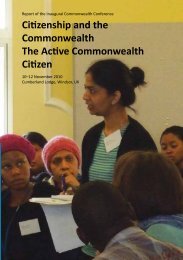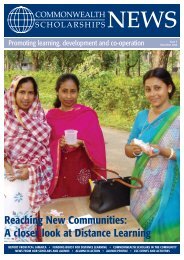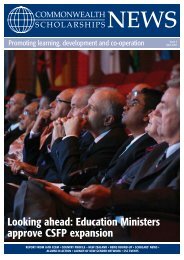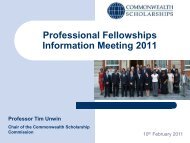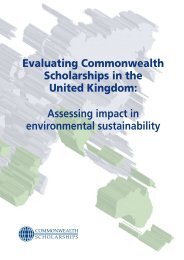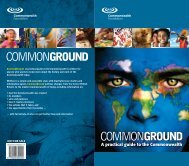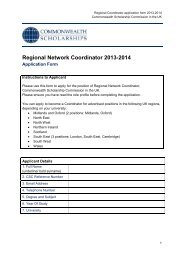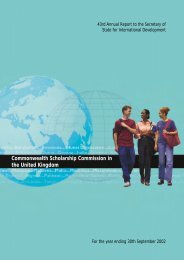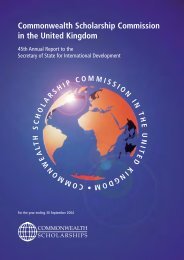42nd Annual Report - Commonwealth Scholarship Commission in ...
42nd Annual Report - Commonwealth Scholarship Commission in ...
42nd Annual Report - Commonwealth Scholarship Commission in ...
Create successful ePaper yourself
Turn your PDF publications into a flip-book with our unique Google optimized e-Paper software.
CSFP INTERNATIONAL<br />
‘The <strong>Commonwealth</strong> <strong>Scholarship</strong><br />
and Fellowship Plan should be<br />
expanded and diversified so as to<br />
<strong>in</strong>clude more flexibility such as<br />
short term and split site<br />
programmes along with traditional<br />
awards and, where appropriate,<br />
those which focus on<br />
developmental and poverty<br />
reduction objectives should be<br />
encouraged’<br />
Education for Our Common Future<br />
Statement from the 14th<br />
Conference of <strong>Commonwealth</strong><br />
Education M<strong>in</strong>isters<br />
November 2000<br />
At the time of its formation, the aspirations of CSFP’s founders went beyond the<br />
establishment of a scholarship scheme. They regarded the Plan as a political statement<br />
– that the <strong>Commonwealth</strong> comprised a group of <strong>in</strong>dependent countries, each able to<br />
contribute dist<strong>in</strong>ctive experience and facilities, but collectively stronger through<br />
shar<strong>in</strong>g and jo<strong>in</strong>t action. Fundamental to this vision was the idea that scholarships<br />
should be held <strong>in</strong> both developed and develop<strong>in</strong>g countries.<br />
S<strong>in</strong>ce that time, over twenty countries have hosted <strong>Commonwealth</strong> <strong>Scholarship</strong>s. For<br />
British students, the Plan has provided opportunities to study <strong>in</strong> locations not available<br />
under any other scheme, as well as more conventional dest<strong>in</strong>ations such as Australia,<br />
Canada and New Zealand. Equally important, it has the potential to be a major force<br />
for shar<strong>in</strong>g of expertise between develop<strong>in</strong>g countries, through south-south<br />
collaboration, and for apply<strong>in</strong>g the professional skills of developed countries to<br />
specific problems of the develop<strong>in</strong>g world.<br />
Throughout the 1990’s, however, this aspect of the scheme decl<strong>in</strong>ed, with only seven<br />
countries host<strong>in</strong>g awards <strong>in</strong> the three years to 1999. <strong>Commonwealth</strong> Education<br />
M<strong>in</strong>isters, at their 2000 conference, pledged to reverse this trend, aim<strong>in</strong>g to double the<br />
number of countries offer<strong>in</strong>g awards by the time of their next meet<strong>in</strong>g <strong>in</strong> 2003. To<br />
encourage this process, the <strong>Commission</strong> took the <strong>in</strong>itiative <strong>in</strong> conven<strong>in</strong>g a meet<strong>in</strong>g of<br />
host nations – the first for many years.<br />
The meet<strong>in</strong>g, held at Marlborough House <strong>in</strong> July, attracted representatives from<br />
thirteen countries – all of which made commitments to offer awards <strong>in</strong> 2002-03. As a<br />
result, scholarships will be available <strong>in</strong> countries as diverse as Australia, Brunei,<br />
Cameroon, Canada, India, Jamaica, Malaysia, Mauritius, New Zealand, Nigeria,<br />
Uganda, the University of the South Pacific and the United K<strong>in</strong>gdom. Together with<br />
South Africa (for which the first selection has already been made) and the long<br />
stand<strong>in</strong>g support of Tr<strong>in</strong>idad and Tobago, these commitments should ensure that the<br />
ambitious target of M<strong>in</strong>isters will be met.<br />
Discussions at the meet<strong>in</strong>g, however, were not conf<strong>in</strong>ed purely to generat<strong>in</strong>g more<br />
awards. Delegates took the opportunity to propose wider improvements to the entire<br />
management of the scheme, and the f<strong>in</strong>al statement called for:<br />
• more contact between host nations – to monitor progress, discuss common problems<br />
and encourage good practice<br />
• more variety <strong>in</strong> the type of award offered – with greater imag<strong>in</strong>ation both <strong>in</strong> the type<br />
of awards which would benefit develop<strong>in</strong>g countries, and which could be offered by<br />
such countries. Examples might <strong>in</strong>clude exchange arrangements, awards targeted on<br />
specific countries, short-term fellowships and split-site arrangements<br />
• greater diversity <strong>in</strong> the fund<strong>in</strong>g mechanisms used to support awards – for example<br />
use of non-governmental sources, or jo<strong>in</strong>t awards between countries, or with<br />
universities<br />
• renewed efforts to raise awareness of the scheme amongst students – particularly<br />
with respect to study <strong>in</strong> develop<strong>in</strong>g countries<br />
• establishment of a central <strong>in</strong>formation po<strong>in</strong>t – <strong>in</strong>itially based at the Association of<br />
<strong>Commonwealth</strong> Universities – through which <strong>in</strong>dividual countries can notify new<br />
award offers or other developments<br />
Countries offer<strong>in</strong>g awards under CSFP<br />
CSC <strong>Annual</strong> <strong>Report</strong> page 12


